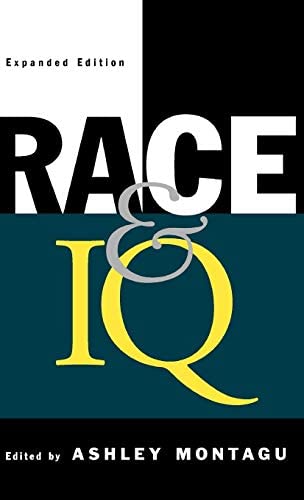Newly released
This book is new and will be uploaded as soon as it becomes available to us and if we secure the necessary publishing rights.

Race and IQ Book PDF
(0)
Author:
Ashley MontaguNumber Of Reads:
165
Language:
English
Category:
Social sciencesSection:
Pages:
502
Quality:
excellent
Views:
1224
Quate
Review
Save
Share
Book Description
Ashley Montagu, who first attacked the term race as a usable concept in his acclaimed work, Man's Most Dangerous Myth, offers here a devastating rebuttal to those who would claim any link between race and intelligence.
In now classic essays, this thought-provoking volume critically examines the terms race and IQ and their applications in scientific discourse. The twenty-four contributors--including such eminent thinkers as Stephen Jay Gould, Richard Lewontin, Urie Bronfenbrenner, W.F. Bodmer, and Jerome Kagan--draw on fields that range from biology and genetics to psychology, anthropology, and education. What emerges in piece after piece is a deep skepticism about the scientific validity of intelligence tests, especially as applied to evaluating innate intelligence, if only because scientists still cannot distinguish between genetic and environmental contributions to the development of the human mind. Five new essays have been included that specifically address the claims made in the recent, highly controversial book, The Bell Curve.
Must reading for anyone interested in racism and education in America, Race and IQ is a brilliantly lucid exploration of the boundary line between race and intelligence.
Ashley Montagu
Montague Francis Ashley Montagu (June 28, 1905-November 26, 1999) – born in Israel Ehrenberg - was a British-American anthropologist who popularized the study of topics such as race and gender and their relationship to politics and development.
It was planned, in 1950, for a UNESCO statement "The Question of Race".
As a young man he changed his name from Ehrenberg to "Montage of Francis Ashley Montagu". After moving to the United States, he used the name "Ashley Montagu".
Montagu, who obtained American citizenship in 1940, has taught and lectured at Harvard, Princeton, Rutgers, University of California, Santa Barbara, and New York University.
Forced out of his post at Rutgers after McCarthy's hearings, he re-established himself as a public intellectual in the 1950s and 1960s, appearing regularly on television shows and writing in magazines and newspapers. He authored more than 60 books throughout his life. In 1995, the American Humanist Association named him "Humanist of the Year".
Montagu Israel Ehrenberg was born on June 28, 1905 in London, England. He grew up in the East End of London. Remember that he was often subjected to antisemitic abuse when he ventured out of his ghetto. Montagu attended Central Foundation School for Boys.
He developed an interest in anatomy very early on, and as a boy he befriended the Scottish anatomist and anthropologist Arthur Keith who studied under his supervision informally.
In 1922, at the age of 17, he entered University College London, where he received a diploma in psychology after studying with Carl Pearson and Charles Spearman and taking courses in anthropology with Grafton Elliot Smith and Charles Gabriel Seligman.
at the London School of Economics, where he became one of the first Bronisław Malinowski students. In 1931, he immigrated to the United States. At the time, he wrote a letter introducing himself to Harvard anthropologist Ernest Hutton, claiming that he was "educated at Cambridge, Oxford, London, Florence, and Columbia" and had both MA and Ph.D.
In fact, Montagu did not graduate from Cambridge or Oxford and did not have a Ph.D. yet.
He taught anatomy to dental students in the United States, receiving his doctorate in 1936, when he submitted a thesis at Columbia University, Becoming Among Indigenous Australians: A Supervised Study of the Reproductive Beliefs of Australia's Aboriginal Tribes. Written by cultural anthropologist Ruth Benedict. He became Professor of Anthropology at Rutgers University, working there from 1949 until 1955.
During the 1940s, Montagu published a series of works questioning the validity of race as a biological concept, including UNESCO's "Manifesto on Race", and The Legend of the Most Dangerous Man: The Race Fallacy. He was particularly opposed to the work of Carlton S. Conn, the term "race". In 1952, together with William Vogt, he delivered the first memorial lecture to Alfred Korzybsky, opening the series.
Book Currently Unavailable
This book is currently unavailable for publication. We obtained it under a Creative Commons license, but the author or publisher has not granted permission to publish it.
Rate Now
5 Stars
4 Stars
3 Stars
2 Stars
1 Stars
Race and IQ Quotes
Top Rated
Latest
Quate
Be the first to leave a quote and earn 10 points
instead of 3
Comments
Be the first to leave a comment and earn 5 points
instead of 3